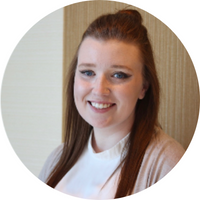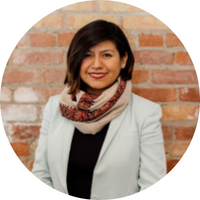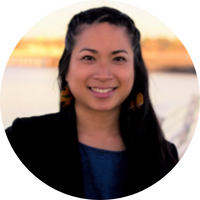
Learn about our 2021 Women4Climate Toronto mentees and their projects below.

Hillary currently lives and works in Toronto with her guide dog, Margarita. She has a BA in Global Studies with Minors in Social Entrepreneurship and Arabic, and she recently completed an MA in Religion, Culture, and Global Justice. After suddenly and unexpectedly losing her vision in 2016, Hillary quickly involved herself in numerous initiatives and communities that are committed to expanding opportunities and rights for persons with disabilities. In addition to the her work with STIL, she is also currently working with other female athletes with vision loss to develop Canada’s first women’s blind hockey and blind football teams.
Sustainability is everyone’s responsibility. At STIL, they look to bridge the gap between sustainability and accessibility, thereby enabling all community members, regardless of ability, to be stewards of the local and global environments. They do this by providing businesses, institutions, and communities with the WasteFinder. The WasteFinder is a two-part system that provides both tactile and visual information to assist individuals with vision loss, and all individuals, to independently dispose of their waste in public. The WasteFinder is placed on the ground and is meant to alert those who pass over it that they are in the vicinity of a waste container.
The WasteFinder benefits the environment and addresses the impacts of climate change because it makes the process of waste disposal more accessible and inclusive. Communities that implement the WasteFinder can expect a reduction in the amount of litter, as the process for finding waste units will be clearer and more accessible. They can also expect the diversion of waste from landfills, as the process for sorting waste into the appropriate waste streams will be clear and standardized, thereby reducing contamination.
Hillary’s motivation to create STIL started about a year after she lost her vision. She was becoming increasingly frustrated with the inaccessibility of the built environment and of her inability to participate in seemingly simple tasks, such as proper waste disposal.
After conducting some preliminary research on the topic of accessible waste disposal, she quickly learned that it was a topic that had not been previously addressed within either the sustainability community or the disability community. As such, she decided to create her own solution to this common problem.
To do this, she held a series of design labs with various stakeholders including individuals with vision loss, custodial staff, environmental activists, the Canadian National Institute for the Blind, and a manufacturer of waste containers.
Hillary and STIL are committed to co-creating a planet that recognizes and incorporates the diverse needs of individuals with disabilities in sustainability planning and initiatives. She believes that everyone, regardless of ability, has a shared responsibility to make the planet more sustainable, and she looks forward to spearheading this grassroots movement with other leaders.
Watch the video below to learn more about Hillary’s project.

I am currently enrolled in a Master of Environmental Studies at York University. My research centers on waste management, Circular Economy and Zero Waste principles through the lens of corporate social responsibility. I aspire to help organizations mitigate their waste for a more sustainable future.
To improve waste diversion rates at Toronto’s events, this project will streamline all necessary information for event organizers looking to manage their waste on one interactive website to avoid confusion and ambiguity. The interactive website will provide step by step instructions, resources and best practices. It will hold events in Toronto to a higher standard by improving on current relevant requirements and provide a sense of accountability to ensure that waste management is a priority.
Changes will be implemented after meetings and interviews are conducted with event organizers to ensure that the resources provided will be catered to them and that the process is as easy and efficient as possible.
The goal is to apply Zero Waste principles to Toronto’s events to minimize the amount of waste, increase diversion rates, educate the public, create resources and tools that can eventually be used by other cities.
By improving waste management practices, we can reduce debris from entering our watersheds, polluting our environment and prolong the lifespan of our landfills.
When I was participating in charity run events and food festivals, it occurred to me that waste separation was not prioritized, and waste diversion efficiency could have been improved.
The following year I stopped attending these events because I felt guilty supporting organizations that were part of the city’s waste problem.
I realized that I should stop avoiding the problem and be apart of the solution. From then on, I started brainstorming on how I could participate in these events without feeling guilty about the waste being generated so that I could continue to support Toronto’s community and culture.
I once went on a submarine excursion in Mauritius to see the beauty of the ocean that I had engrained in my mind from all the documentaries I had watched. Unfortunately, what I experienced was the aftermath of a dead ecosystem. The corals were dying and no one around me was talking about it. This was my motivation for creating an impact through the field of waste management. I want to protect the ocean and all its beauty by preventing the waste and harmful contaminants from leaching into the ocean and addressing the issue directly at the source.
Learn more about Sophie’s project below.

Ann Chen is a final year Philosophy, Politics, and Economics student at Yale-NUS College. Her academic interests include climate diplomacy, the integration of renewable energy into electricity systems, and sustainable economic transformation policy.
She has worked with Deloitte’s Silicon Valley-based think tank – Center for the Edge – to develop sustainable transformation strategies for businesses and advised governments to build a strong sustainable finance sector. She aims to bridge the gap between the private and public sectors to develop a more sustainable, low-carbon economy.
Watch the video below to learn more about Ann’s project.

Jessica is a Toronto-based designer guided by empathy, intuition, and community. She uses her creative skillset to envision a brighter tomorrow: one built on social and environmental cohesion. Jessica’s passion for urban revival remains at the forefront of her priorities and when not designing for clients, she can be found reimagining public and private land into multi-faceted oases in support of climate resiliency and visual harmony. Her aim to create a positive legacy that future generations can thrive in.
Westra project is a city-wide initiative aimed at revitalizing underused park space into multi-faceted, dry storm water ponds. The goal of this project is to reconnect our parks with urban natural systems and engage communities to help protect these safe havens against intensifying ecological and social demands. In support of Toronto’s Wet Weather Flow Master Plan and Parkland strategy, these repurposed landscapes will help mitigate the effects of water pollution and run-off into our waterways, as well as recycle rainwater back into the hydrological system for park irrigation and maintenance purposes. The amphitheater style structure will also be experiential and serve a social purpose for inclusive community and educational events. By engaging with these spaces in different social ways, barriers between the public and personal realm can dissolve to minimize future neglect and degradation of these vital public spaces.
Over the last 10 years I’ve been forming my own personal narrative on how I can better influence Toronto’s future and it wasn’t until the lockdown that I started turning my ideas into actions. This shift began during my time outdoors in the city, weaving through the different pockets and noticing the unrealized potential of our park system. As a result of the pandemic, our parks have become more than ever our safe havens, where we can safely connect with friends and family, find solace, exercise and self-reflect. This light through the darkness is what help spark my passion to improve and protect these areas for generations to come.
I am motivated by the concept of designing with nature, attuning to the rhythms of our environments and respecting the yields of natural resources rather than dominating. With the decline in the planet’s health, at the hands of unsustainable, institutional models of growth, I feel a sense of responsibility to set in motion adaptive measures that offset this existing trajectory. My motivations are fueled by the inspiring work of individuals, companies and countries, who are developing environmentally creative projects that repurpose our landscapes to support climate resiliency.
Watch the video below to learn more about Jessica’s project.

Jane Ji is an award-winning game designer and producer. In tandem with her team, she created the award-winning kids mobile game series iBiome. As a co-founder of Springbay Studio, Jane created the iBiome series in 2014 to educate children and create a generation that cares about conservation and climate change. Her first game in the iBiome series, iBiome-Wetland, produced many notable awards, including Best STEM app 2015 from the American Association of School Librarians. Her second game in the series, iBiome-Ocean, has been featured by Apple’s iTunes Store worldwide a few times, and has been recognized by the United Nations Environment Programme. In her newest game, iBiome-Changing Ice, Jane invites kids to play with climate change scenarios, setup their goals to reduce their eco-footprint, and use AR technologies to track their sustainable real life choices.
It’s a year-around kids-to-kids competition that will recognize the top learners, the best hands-on projects about nature, and the smallest eco-footprint as tracked by the AR technology built in our new game.
The project has three key focuses: play to learn, play to win and play for our future.
Kids build virtual habitats, manipulate climate change scenarios, and experience how our everyday choices affect the world around us, through gaming.
We will host year round kids-to-kids competitions that will recognize the top learners, the best hands-on projects about nature, and the smallest eco-footprint as tracked by the AR technology built in our new game.
We aim to gamify children’ environmental first steps to inspire them take action and become lifelong learners and doers.
We expect that on average each kid can save 0.5 ton of GHG emission per year by participating in this League program. The more children we could serve worldwide, the bigger measurable GHG reduction we can achieve. We build our games to scale globally. We are localization-ready and can expand to any C40 cities, allowing us to grow in an aggressive way.
In her Earth Day 2018 Google doodle video, Dr. Jane Goodall said: “Every single individual matters, every single individual makes some impact on the planet every single day, and we have a choice as to what kind of difference we are going to make.”
It is critically important to nurture the young minds with an important understanding of how we depend on our environment. I want to build a program, where kids are more engaged with climate change through fun activities and see the hope of our future by reducing their GHG emissions in the real world.
Climate change is the most unprecedented crisis facing humanity right now. Every decision we make as an individual does not seem much, and the catastrophic consequence of climate change can not be easily seen. That’s the dangerous part of this crisis. I want to use technology to help our future generations experience climate change through the media they love and to show them the hope in our future when we all start reducing our eco-footprint.
I am a mother and am committed to best use my professional skills to help build a more sustainable future that starts with us.
Find out more:
Facebook Instagram Twitter Website
Watch the video below to learn more about Jane’s project.

Anum is a Graduate Research Student at Ryerson University in Toronto, Canada. She holds a bachelor’s degree in Civil Engineering and is currently completing a Master’s degree in Environmental Engineering. Her research focuses on mitigating the impacts of “flushable” consumer products on urban wastewater collection systems.
Anum is an active participant in water organizations, like the International Water Association, Canadian Water Network, and the Canadian Association on Water Quality. She has a passion for machine learning and innovating water technologies that incorporate some form of deep learning.
She exemplifies leadership through her participation in Engineers Without Borders, where she currently oversees a youth-led non-profit initiative aimed at raising awareness in youth on local and international water challenges.
In her spare time, Anum enjoys spending time with her family, riding her bike around the block, and reading up on notable autobiographies.
Hydro Intelligence is a spinoff of HydroHaus, which was a project Anum participated in with a student team during a university-level competition among other student design teams across Ontario. Her team placed first place in the competition and is now working to scale HydroHaus.
Hydro Intelligence will mitigate the impacts of intense rainfall events in the Greater Toronto Area through the implementation of GIS-and AI-based measures at the property and neighbourhood levels. The GIS-analysis is being performed through HydroHaus, and the AI-based measures will be performed through image collection, transfer, and processing performed at outfalls and CSO discharges.
The impacts of intense rainfall events do not go unseen. Rather, they have begun to appear more evident over the last decade as we’ve witnessed high-frequency flooding events in the downtown core. This project will address the impacts of these flooding events by using the data from the GIS and AI tools to propose low-impact development measures for property owners (to address the property level) and urban planners (to address the neighbourhood level) to reduce the quantities and effects of high peak stormwater runoff.
This idea was not a sole contribution but rather, the team I was working with over the course of the Rain It In competition came up with the idea behind HydroHaus together. Our team was comprised of engineering students, environmentalists, data analysts, and urban sustainability students. Moreover, I was also working as a research student simultaneously on quantifying the impacts of so-called “flushable” consumer products. Merging these two projects together led me to develop Hydro Intelligence.
When I visited Pakistan for the first time in July 2012, I was clueless to the fact that this was a nation hard-hit by climate change. That initial realization led me to develop a stronger passion for a more sustainable planet.
I chose to study Civil Engineering with a focus on SDG #6: Ensure availability and sustainable management of water and sanitation for all. Having the opportunity to address water management issues in an integrated context through my studies has further motivated me to continue my quest for knowledge.
I aspire to build bridges between Canada and developing countries to better address the issue of water scarcity in both urbanized and remote regions.
Find out more:
LinkedIn Twitter Website
Watch the video below to learn more about Anum’s project.

I have started the grass-roots neighbourhood group “Climate Change in Mount Dennis” where we combat the effects of climate change through local partnerships by educating and providing events and opportunities for the community.
As I have worked with various populations through my studies in Early Childhood Education & Social Service Work, I’ve grown to see the influence of our environment playing a pivotal role in the social determinants of our health. Leading to my mission and passion to bridge the gaps and neglect upon priority neighborhoods of Toronto, nationally and globally.
I also strive to be an example as creative eco-conscious individual through my business “Second Life Sentimentals” where I create unique car décor by repurposing boxboard cardboard materials that would have otherwise been sent to the recycling or waste plants, turned into a sentimental treasure!
The Zero Waste Refillable Market On Wheels will bring accessibility of kitchen and home staples to priority neighborhoods in Toronto that live in food deserts. This market will introduce and normalize sustainable waste management as it encourages communities in stopping the cycle of buying single use packaged items from stores, and instead utilize those clean containers from home to bring to our market on wheels for refill. By driving to food deserts of Toronto, we reduce priority neighborhoods’ carbon footprint they would have otherwise used in travelling by car, transit, or through packaged waste production.
Our goal is to provide dried bulk foods that is gluten & allergen free, and natural home cleaners & self-care products ready for refill for residents living in priority neighborhoods of Toronto.
The Zero Waste Refillable Market On Wheels will have an influence on the circular economy focusing on reducing communal and individual levels of waste production through normalizing the “zero waste lifestyle.” By giving access through our mobile Market, communities will be able to partake in an eco-conscious initiative at an affordable rate.
Through my interest of following a more zero waste and minimalist way of living, I noticed most zero waste and bulk goods shops are placed in shopping centres, plazas or along main streets outside of what is labelled a “priority neighbourhood” in Toronto. The gap was evident to myself, as a resident of Mount Dennis seeing what is of easier access to our community with the development of fast food and convenience stores in closer proximity than a diverse grocery store. Also being a person with food allergies, I want to provide a mobile market with various affordable dietary restrictions.
The Zero Waste Refillable Market On Wheels reframes the narrative of stressors that can come with waste management for individuals or families, by making use of clean containers one already has. I want to normalize frugality and eco-conscious initiatives we can all partake in that is easier than we think!
Through this solution, I strive to provide healthier grocery shopping that is accessible to priority neighborhoods nationally and globally. I believe my solution provides a foundation to one’s snacks and meals where an array of recipes can be developed towards the diverse cultures that can be learned by all.
Watch the video below to learn more about Kristine’s project.

Erika turns problems into solutions, vision into action. Her background is as a creative marketing professional with over 7 years’ experience increasing annual sales for companies in Mexico, UAE and the UK.
In 2018 the picture of a seabird full of plastic showed her the impact of her industry. She realized that as a Marketer, her job was to take a “product” and influence someone to purchase it with little to no thought given to the environmental or social impact of the product.
In 2019, she decided to leave the Marketing industry to found Wisebird where she dedicated her passion and skills to the research and implementation of solutions to single-use plastics, such as Wisebox, Toronto’s first reusable take out container program by deposit. She was nominated for YWiB’s Favourite Women Entrepreneurs in 2020.
Today, she and her passionate team are working on a single dream—a world where a vibrant and conscious humanity is living and working in harmony with nature.
Do you love takeout and want to make the world a better place?
Currently, in Canada, the takeout industry is generating over 1 billion single-use takeout containers annually. Single-use takeout containers waste finite resources, pollute our lakes & oceans, contaminates our blue bins, and endangers vital ecosystems. But this problem is not only about our ecosystems; it is also about our health.
So, what if Toronto had only two bins for waste, organic and recycling, and we simply didn’t send anything to the landfill? What if we made single-use plastic nothing but a bad memory from times gone by? What if we could live without compromising the environment, AND we were rewarded for it? Yes, we know it’s a pie in the sky, but we don’t have to do it all in one go. We can get there, one takeout at a time.
Inwit is an online platform that will help you to skip waste while enjoying your favourite takeout warm and free of nasty chemicals; inwit app will provide a space to:
Since I became aware of my impact, I changed my lifestyle. Still, I was frustrated by the lack of alternatives to live sustainably, especially with food — a basic need.
I thought that providing an option to avoid single-use plastic, the problem could be solved. But after implementing Wisebox and engaging with users, I quickly realized that we were facing a bigger issue: self-interest and misinformation.
What if we live without compromising our ecosystems, and we were rewarded by it? Inwit is a mindful option to single-use packaging and to take action. At Inwit we are working to make sustainability more understandable and exciting.
I was born in Mexico City, a regular person living in an ideology of money linked with happiness and success. I was looking to spend my weekends inside shopping malls with limited contact with nature.
Lead by a curiosity for other cultures, six years ago, I decided to go to India. On that travel, impacted by the Himalayas’ beauty, I discovered how much I love nature and the mountains, and later in my trip, a bird showed me my life cause.
We are more connected with nature than we believe, and I want to protect it and protect us.
Find out more:
Facebook LinkedIn Website
Watch the video below to learn more about Erika’s project.

Anélia Victor is a Toronto based mixed media textile artist. Anélia’s founding themes are identity, herbalism and Afrofuturism with a focus on Black and Queer Histories, Caribbean textile history, using a futuristic lens for textile sustainability and incorporating the body as a medium while interconnecting identity structures.
ANEW is a functional structural sculpture is a machine in which used textiles will be shredded, liquified and spun into new fibres with seeds and weaved into new biodegradable textiles. The purpose of this sculpture is to find new methods to recycle and reused textiles that are no longer being used and change the cycle of textile waste.
I initially had an idea about creating a hat that would have seeds implemented inside that would grow after it was used. From there, I thought what if that idea can be used on creating a new recycling method.
We can collectively be able to live on our planet freely and find ways to that.
Watch the video below to learn more about Anelia’s project.

Rachel is second generation Chinese Canadian and currently living in Toronto in the Dish With One Spoon Territory. Rachel is often curious about the modern human conceit in highly developed industrialized nations like Canada. She is interested in unpacking how our unconscious privileges fail to reflect that self-preservation relies on the care of diverse human identities and the larger natural world. With a lens on racial equity and environmental conservation, Rachel seeks to understand collaborative survival as a way to transform life beyond capitalism and industrialism. Through the Bike Brigade, she attempts to use the power of mutual aid and active transportation to address poverty and racial inequity in Toronto.
The Bike Brigade emerged in response to the COVID-19 pandemic as a mutual aid grassroots organization in Toronto. We pair volunteer cyclists with community organizations that serve isolated, vulnerable people, seniors and health care providers to deliver essential supplies, such as hot meals, groceries and medical supplies.
We are a community of 500+ volunteer bikers and offer our delivery services free for equity-seeking groups across Toronto, including FoodShare, Black Lives Matter TO, Toronto Drop-in Network, Parkdale People’s Economy and the People’s Pantry. Between March and September 2020, we have replaced cars and trucks in delivering $16,000 worth of groceries, 2,000 food boxes, and 1,200 hot meals.
It is a privilege to be stepping into the role of Executive Director of the Bike Brigade – I am excited to work with Dave and our new Board of Directors. Through this mentorship programme, my goal is to develop and implement a Climate Action Plan for the Bike Brigade to track and report on reduced GHG emissions. Other key elements of this plan include bike infrastructure in the city, biker rights and safety, and access to biking for BIPOC communities. We look forward to continuing our efforts long-term to support our community partners and align these efforts with other cities.
The Bike Brigade was named and founded by my friend Dave Shellnutt. Dave started the Bike Brigade in March when the stay-home measures started coming into effect. Dave is a human rights and personal injury lawyer – his law firm goes by ‘The Biking Lawyer’. As the name assumes, Dave is also a very passionate Toronto cyclist! His huge network of bike advocates and organizations have all really gravitated to the Bike Brigade.
Just in the two years I was living in Solomon Islands, 4 nearby islands vanished under water, displacing these communities from their homes. The disproportionate impact of climate change on South Pacific islanders is real and happening right now. After returning to Canada, I could see that the disproportionate impact of climate change also extended to racialized communities in the City of Toronto – in my own backyard. I think about newcomers and language barriers when reading English/French emergency alerts, low-income communities situated in flood-prone areas, and the list goes on. We can do better.
Find out more:
Facebook Instagram Twitter Website
Watch the video below to learn more about Rachel’s project.

Melanie is an English, history, French, and social science teacher with the Dufferin-Peel Catholic District School Board in the GTA. Her goal with every class is to ensure that her students’ work has meaning, and that they have opportunities to gain recognition beyond the classroom for the work they do in school. She is an active contributor to a variety of youth education and involvement initiatives with organizations including the Canadian Society for Yad Vashem, the Juno Beach Centre Association, the Legislative Assembly of Ontario, and the CAS Trips Global Student Conference on Climate Change. She is currently preparing a workshop addressing the gender disparity in post-secondary STEM disciplines and fields; the workshop is scheduled for presentation at UBC’s STEM 2021 Conference in July. Melanie is completing the final year of her Master’s degree in Interdisciplinary Studies at York University.
My project aims to increase high-school students’ participation in local climate action that directly supports Toronto’s climate action strategy as outlined in TransformTO. Additionally, through their involvement, female-identifying students will be able to demonstrate to Women4Climate their potential to be the city’s future climate action leaders.
I will create end-of-unit projects and course culminating performance tasks (CPTs) that, while achieving various TransformTO goals that involve students in climate action in their own communities, still allow students to demonstrate their learning of subject-specific skills in relevant, self-selected, real-world applications. To encourage teachers to replace their existing assignments with the new projects and CPTs, I will provide evaluation rubrics so that teachers know how the work correlates to the Ontario curriculum’s achievement objectives and levels.
I will also develop a submission process so that students can share their ideas, projects, and success stories with the City of Toronto and W4CTO. In this way, students can engage in schoolwork that truly matters, the city can keep abreast of grassroots efforts that its younger citizens are undertaking to meet its climate action goals, and W4CTO can establish relationships with potential future mentorship candidates.
More than a decade of working with students has shown me how observant teens are of their own communities, how much they care about making a positive contribution to those communities, and how passionate they are about the environment and climate action. These insights, coupled with my habit of always trying to find new ways for students to demonstrate their learning, led me to consider adapting the work my students and I did at the 2019 Global Student Conference on Climate Change in Edinburgh, but for a local audience.
Young people motivate me to act on behalf of our planet. I wish they didn’t have to worry about environmental collapse caused by previous generations. Wishing accomplishes nothing, so instead I’ll try to fix some of the problems I helped to cause. It may seem almost impossible for any one person to contribute meaningfully to solving the world’s environmental issues. However, the current wave of climate action being led by Greta Thunberg reminds me that one person can make a world of difference.
Find out more:
LinkedIn
Watch the video below to learn more about Melanie’s project.

Corals is a second-year Master of Environmental Studies in Planning Student at York University, with a concentration in Urban and Regional Development. Her research interests focus on land-use in Toronto, and her master’s project seeks to examine neighbourhood change and the studentification of the West Chinatown neighbourhood. Corals is passionate about sustainable urban development and resilient infrastructure in response to the challenges of climate change.
Pollinator-Friendly Green Spaces aims to explore methods of retrofitting existing green spaces to support biodiversity, in addition to mitigating the effects of flash flooding in Toronto. The goal of the project is to create a guidance document of ways in which native species can be incorporated into new and existing residential developments and specific design strategies that can minimize landscape maintenance and water usage. Native plant species, in contrast to existing grassy lawns, have a deeper root network, and thus can better reduce soil erosion, aid in climate regulation through water absorption, and flood mitigation. Meadow-like spaces offer a rich variety of food and shelter for native species of bugs, birds, and insects, and when scaled up to the neighbourhood scale, has the potential to enhance and conserve Toronto’s biodiversity.
I was a beekeeper during my undergraduate years. While keeping honeybees is arguably worse for native pollinator species, the experience made me hyperaware of how pollinators interact with urban green spaces in general and the city’s potential for conservation. The landscapes of Toronto’s neighbourhoods are mostly dominated by a non-indigenous monoculture as ground cover and meticulously maintained through watering, mowing, fertilizers, and herbicides. Yet, these neighbourhoods are connected to Toronto’s natural heritage system, and therefore, play an important role as a form of green infrastructure. The tension between these two facades of green spaces is the inspiration behind the project.
I am committed to sustainability and good urban design because it is the right thing to do. The increasing challenges of the Anthropocene are created in the global north through decades of extraction and exploitation. However, the effects disproportionately affect the most vulnerable peoples, ecosystems, and species, everywhere but also right here in Toronto. Cities are important spaces in which the effects of climate change, as well as the solutions, localize in a tangible and feasible way. As such, sustainability is not just about the future, but also reconciliation and atonement.
Find out more:
LinkedIn
Watch the video below to learn more about Corals’ project.